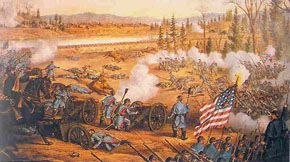While momentum has shifted to the Confederacy in the wake of the recent, successful repulsing of the Union offensive against the nation’s capital of Richmond, much of Tennessee remains under Union control. In response to the U.S. presence in Tennessee, Confederate Brig. Gen. Nathan Bedford Forrest for several weeks has been conducting calvary raids in the middle of the state, striking at Union forces when advantageous.
Today, Forrest’s raiders surprise the Union garrison at Murfreesboro.
The town is a key Union supply center on the Nashville & Chattanooga Railroad. In addition, a number of Confederates are held as prisoners in Murfreesboro. Among the prisoners are twelve locals, under arrest for alleged participation in a recent assault upon federal troops. Among these dozen Confederate locals is Primitive Baptist preacher, W. R. Owen.
Forrest’s early morning ambush on Union forces at Murfreesboro strikes a blow to the federal presence in middle Tennessee. All Union soldiers and officers are killed or captured, to the joy of locals. Owens and his fellow prisoners are freed.
Forrest’s Confederates also destroy Union supplies and the railroad track in the area, further hampering Union advances in Tennessee. Yet the greater significance of today’s Confederate victory is the resulting Union reaction. Federal forces en route to Chattanooga are quickly diverted to Murfreesboro, providing an opening for Confederate General Braxton Bragg to amass southern forces near Chattanooga in preparation for a September invasion of neighboring Kentucky.
Sources: Battle of Murfreesboro (link); “Forrest’s Attack on Murfreesboro,” a first-hand account from a citizen of the town (link); John R. Poole, Cracker Cavaliers: The 2nd Georgia Cavalry Under Wheeler and Forrest, Macon, Ga.: Mercer University Press, 2000, pp.19-21 (link); image (link)



